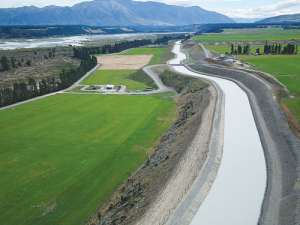He says NZ uses only 4% of its water and it is a shame to see the amount of water pouring down the river off the mountains and out to sea during heavy rain.
“When you spend time in Asia you see how much water is highly preserved there,” he says.
Harrison hails from mid-Canterbury where irrigation in NZ started. The Rangitata diversion scheme was built by the Labour Government as a way to employ people, its construction starting in 1937.
His grandfather was one of the first farmers to use it.
Harrison says 40% of NZ irrigation use is in Mid-Canterbury yet its rivers are pristine.
The northern branch of the Ashburton River runs through his farm.
“There has been some build-up of nitrate levels, but the real reason for that is because we became so efficient at using irrigation.
“Before then it was a flood irrigation system: you would build dykes then let the water run and that made sure the aquifers were recharged,” he explains.
“When we moved to pivots we got too efficient, we used satellites on them and the amount of monitoring of water is incredible.
“I don’t think urban NZ has any idea what sort of technologies are actually at work.
“As a result of that during two dry seasons our nitrate levels increased. Now we are finding a way to recharge the aquifers and we have a managed aquifer recharge operation going on just north of Ashburton. I am on the governance group of that.”

















